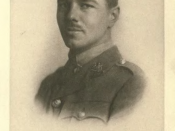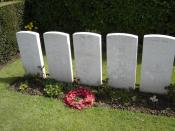'Wilred Owen' a war poet who rote many tens of poems, emphaticed his visual experiences of carnage in war, in his poems. One poem that presented the pacifism of war is 'Dulce et decorum est'. Through this poem vivid depiction is utilised with the co-operation of techniques such as, extensive imagery, alliteration, onomatopoeia, simile and symbolism to show his audience of the horrific environment that was savored. "Dulce et..." is a poem that challenges old conventions in its portrayal of the realities of war.
The first section that the reader is enlightened with is the title "dulce et.." which conveys associated connotations of patriotism, however the literal definition is ' it is sweet and honourable to die for ones country'. This definition is utilised in an ironic way in comparison with the body of the poem as it composes a completely opposing view of death and war. Moreover, the title accentuates a sharp contrast to the rest of the poem, because it implies that the poem is going to celebrate a positive aspect of life, although it illustrates the bloodcurdling realities of war and death practiced by the soldiers.
The opening lines of the poem "Dulce et..." directly recreate and alter new images of war over those orginally existing in the readers mind. The soldiers are initially portrayed as wretched, like "old beggars" and "hags". Additionally, "knock-kneed" "we cursed through sludge". Imagery helps to describe and explain the harsh conditions faced by soldiers. Furthermore, it explores images of severe pain, utter exhaustion and desperate struggle. Moreover, alliteration is exposed that emphasises the significance and suffering of the men on the battlefield.
Throughout the first stanza, Owen shows us the state in which the soldiers are experiencing, as "men marched asleep" and "all went lame, all blind". Despite the difficulty confronted,


